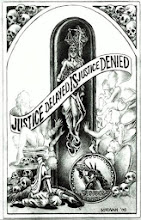
Let the Sun Shine In
The Senate has no business keeping secrets from the American people.
BY MANUEL MIRANDA
Friday, August 12, 2005 12:01 a.m. EDT
"These Supreme Court hearings will be the first in the Internet era and it is important that the Committee be ready for this event." So begins an internal memorandum recently sent by the Senate archivist to all Judiciary Committee staff instructing them that federal law requires the preservation of all documents and e-mails generated in relation to the confirmation of Judge John Roberts, including e-mail correspondence from outside organizations such as "Alliance for Justice, People for the American Way, Judicial Working Group, etc.," as well as "replies."
Oh my.
A glossy Senate brochure produced late last year makes more explicit what the law requires to be preserved: "staff analytical memos, communications (textual and electronic) with Senate leadership, committee members, agency staff, and interested parties, including substantive e-mail."
Good.
According to federal law, such Senate committee working papers and e-mail correspondence is not the property of any senator or staff member. They are public property to be delivered to the National Archives at the end of each Congress.
Well, I told you so.
Readers of this Web site will recall last year's pseudoscandal, involving yours truly, over the reading of Democratic memos left unprotected on the Senate Judiciary Committee's shared network through the negligence of Democratic staff. From the start, I admitted to the grave crime of, er, reading.
The published Democratic strategy papers revealed that Democrats blocked judicial nominee Miguel Estrada because he was Hispanic, that they conspired with interested litigants to affect the outcome of pending litigation, and that they allowed radical liberal groups to call the shots in the Senate. The still-unpublished memos also showed, in my legal opinion, acts of corruption and illegality by some Democratic senators and their staffs. I documented all this in my essay, "The Politics, Ethics, and Law of a Republican Surrender" (available here in PDF form), and I brought a civil action (information here) to prove my point.
I argued that such Senate documents are public, not private or confidential as Democrats have claimed in a so-far-successful effort to protect themselves from scrutiny. The Republican surrender, however, allowed the "Memogate" controversy to focus on the act of reading the memos rather than on their content.
No senator may protect himself from scrutiny for his public work. In fact, Senate staffers are entitled, under the whistleblower provision of the government employee's code of ethics, to read any unprotected document and disclose any evidence of corruption. Federal law is plain. In 1969 Sen. Thomas Dodd's own staff handed his files to the press, and the U.S. Circuit Court of Appeals for the District of Columbia ruled that senators have no privacy interest in Senate-stored documents that are in the public interest.
The Senate archivist's directive that the Roberts documents are public property and should be preserved for public scrutiny and history is no small event. It serves not only historians and journalists. Such sunshine could serve to reduce the increasing corruption of the Senate confirmation process. Yet already Republicans and Democrats are planning to dodge federal law, and the Senate archivist tells me she has no way to enforce it. I disagree. But the Senate leadership, and especially Chairman Arlen Specter, should act to resolve any doubt.
At the Constitutional Convention, the framers debated what Congress could hold secret from the American people. James Wilson declared their purpose well:
"The people have a right to know what their Agents
are doing or have done, and it should not be in the option
of the Legislature to conceal their proceedings."
America's greatest jurist, Justice Joseph Story, would later describe the "Secrecy Clause" that the framers agreed upon (emphasis mine):
The object of the whole clause is to insure publicity to the
proceedings of the legislature, and a correspondent
responsibility of the members to their respective constituents.
And it is founded in sound policy and deep political foresight.
Intrigue and cabal are thus deprived of some of their main
resources, by plotting and devising measures in secrecy.
The public mind is enlightened by an attentive examination
of the public measures; patriotism and integrity and wisdom
obtain their due reward; and votes are ascertained, not by
vague conjecture, but by positive facts. . . .
So long as known and open responsibility is valuable as a check or as an incentive among representatives of a free people.The Secrecy Clause requires that the Senate should make its work public and only that which it, as a whole body, expressly designates may be held secret.
The Senate has made that designation in Senate Rule 22 and in adopting the federal laws that the Senate archivist is seeking now to enforce. It has not designated the Roberts confirmation secret, nor should it.
The Senate leadership should order all senators and staff to preserve everything for archiving, without exception, and committee members should agree now, blind and on a nonpartisan basis, to authorize the National Archives to make such records available without any delay. This should not be a problem for true statesmen who have nothing to hide, especially Democratic senators who insist so strenuously that they, on behalf of the American people, should be allowed to examine the privileged papers of the executive branch.
The author, Mr. Miranda, former counsel to Senate Majority Leader Bill Frist, is founder and chairman of the Third Branch Conference, a coalition of grassroots organizations following judicial issues. His column appears on Mondays, Wednesdays and Fridays in the Wall Street Journal.


0 Comments:
Post a Comment
<< Home